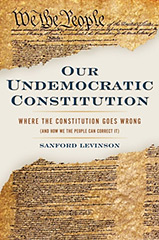On "political questions"
Jeff House wrote as follows:
This is something I certainly haven't considered so far, partly because the "political questions doctrine," assuming it still has real vitality in 2007--there is an extensive scholarly literature arguing that it has basically been dessicated since the Warren Court and its successors--is not "hard-wired" in the way that the subjects I'm primarily interested in are.
This would be an interesting issue to debate at a convention, i.e., exactly what degree of power we really wish to give to courts. The Israeli Supreme Court, particularly under its former President, Aharon Barak, basically recognized no limits on its jurisdiction. Critics argued that this meant that it intruded into areas, including the conduct of Israeli wars, that should properly be left to "political" branches. I don't have firm views on what sorts of limits we should place on courts and, even more to the point, exactly how a constitution might be drafted in order to achieve the optimal solution. Similar issues, incidentally, can be raised with regard to "standing." The Indian Supreme Court seems to give anyone in the country standing to raise any issues of constitutional controversy. Among other things, this helps to account for the sometimes decade-long delays in actually deciding cases. The US, on the other hand, has quite strict standing rules. Once more, I don't have firm views on the "right" balance between restrictive and expansive notions of standing. No doubt a subcommittee at a convention would be appointed to consider the specifics of the jurisdiction of courts, and I'd be intrigued by its ultimate conclusion.
There is one area which interests me in particular. I am interested in the "political questions" doctrine, which seems to be one of a number of principles which render the Executive immune to law.
Most recently, the US Supreme Court has applied that doctrine to the Iraq War. Consequently, that discrete and insular minority known as US servicemen cannot raise the question of the illegality of the war in justifying their refusal to participate.
I hope some of your critique of the US Constitution will include discussion of the political questions doctrine.
This is something I certainly haven't considered so far, partly because the "political questions doctrine," assuming it still has real vitality in 2007--there is an extensive scholarly literature arguing that it has basically been dessicated since the Warren Court and its successors--is not "hard-wired" in the way that the subjects I'm primarily interested in are.
This would be an interesting issue to debate at a convention, i.e., exactly what degree of power we really wish to give to courts. The Israeli Supreme Court, particularly under its former President, Aharon Barak, basically recognized no limits on its jurisdiction. Critics argued that this meant that it intruded into areas, including the conduct of Israeli wars, that should properly be left to "political" branches. I don't have firm views on what sorts of limits we should place on courts and, even more to the point, exactly how a constitution might be drafted in order to achieve the optimal solution. Similar issues, incidentally, can be raised with regard to "standing." The Indian Supreme Court seems to give anyone in the country standing to raise any issues of constitutional controversy. Among other things, this helps to account for the sometimes decade-long delays in actually deciding cases. The US, on the other hand, has quite strict standing rules. Once more, I don't have firm views on the "right" balance between restrictive and expansive notions of standing. No doubt a subcommittee at a convention would be appointed to consider the specifics of the jurisdiction of courts, and I'd be intrigued by its ultimate conclusion.


1 Comments:
The apartheid supreme court in South Africa repeatedly deferred to parliament and the executive under the equivalent of a political questions doctrine. The new constitution therefore made significant structure changes with a separate constitutional court, staggered 18 year terms, and a rule on standing which provides:
Section 38 Enforcement of rights
Anyone listed in this section has the right to approach a competent court, alleging that a right in the Bill of Rights has been infringed or threatened, and the court may grant appropriate relief, including a declaration of rights. The persons who may approach a court are:
(a) Anyone acting in their own interest;
(b) anyone acting on behalf of another person who cannot act in their own name;
(c) anyone acting as a member of, or in the interest of, a group or class of persons;
(d) anyone acting in the public interest; and
(e) an association acting in the interest of its members.
The Constitutional Court has not only established an enviable reputation for is jurisprudence, but ha not suffered the delays seen in both India and the US. Where 2 court systems show similar levels of delay it's a little strange to explain the delays in one on the absence of a rule in one but not the other.
Post a Comment
<< Home